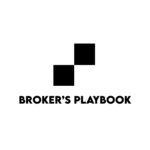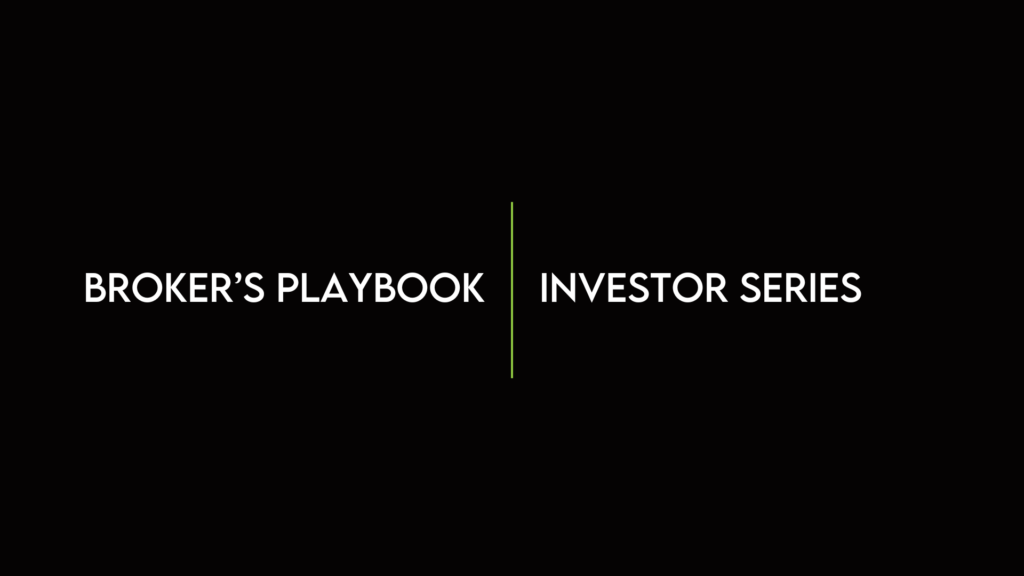
Broker’s Playbook nation. What is up? I am super excited for this week’s podcast. I am having a discussion with Reuven Gorsht from Deeded. I met Reuven at Ontario Real Estate Association’s Reality Plus conference just about six months ago, and since then we’ve stayed in touch. I’ve actually taken his platform and his product for a test drive and have implemented it across my entire team of over 50 senior agents in the GTA. I’m going to have him discuss all the things that have brought him to this point today in creating a platform that is truly streamlining the business. Listen in. I hope you enjoy it and get great value out of it. Let me know in the feedback how this is changing your real estate business and if you see value in it, we’d love for you to share. Talk to you soon. To my brothers and sisters in the business. It is my pleasure once again to be in the studio this morning and I have Reuven Gorsht with me. Reuven is a serial entrepreneur. Reuven has made some pretty damn big accomplishments that I’m going to have him speak to, to open up this recording and share with you his journey and of course, his latest venture, which is deeded, which is a legal platform to help us in the business, really streamline our processes and maintain control of our transactions and the experience of our clients. Reuven, welcome to Brokers Playbook. It’s our pleasure to have you, my man. Start off just by telling us what your day is about today, where you’re at, and let’s get into your story a little bit. Yeah, absolutely, man.
Reuven Gorsht: So pleasure. Pleasure to be here. Thanks again for having me. And for me, my my passion. So just to give you a little bit of background of where I’m coming from and how even, you know, it evolved into what it is today for me, I started my career as an entrepreneur, had parents that, you know, were pretty strict. So they’re like, No, no, entrepreneurship doesn’t work. You got to go to school, get your degree. So I ended up doing that. And for a good, you know, 15, 20 years played in the corporate space, but always in technology, which space incorporate in, in more enterprise software. So that was my that was my foray and really moving up the ladder.
Simeon Papailias: Were you in sales or architecture? What were you in?
Reuven Gorsht: I was I was always a generalist. Right? Because when you start as an entrepreneur, you always, you know, you I love to learn and tinker with different areas. Even as a kid, like I used to, you know, take apart toys and just wanted to understand how everything works. So for me, it was always technology was just kind of a natural right? I had like the Commodore 64 back in the day with the tape drives. They used to take, you know, 40 minutes to load a game. But so when I got into the technology industry and specifically enterprise software, super interesting because you’ve got these massive businesses like BMW and you say, how does BMW like build a car with so many options in a production line? That doesn’t stop. And it’s just fascinating. So I it is fascinating. Yeah. So I had the opportunity to really play in different roles from operations. I had roles in strategy, I had roles of actually building product. So for me, it was really a culmination of understanding all these different areas. And then at some point I knew that I had to go out on my own because I couldn’t achieve what I wanted to really achieve, which is solve real world problems within the walls of a big corporation, right? Where you have, you know, reporting structures and management approvals. And when times are good, you could do, you know, you can innovate a little bit. When times are tough, all of a sudden your your job is on the line when you have innovation and your in your title.
Simeon Papailias: No doubt. I find entrepreneurship very interesting because there’s no there’s no blanket statement that can ever be made. There’s so many drivers to entrepreneurship. There’s people who want to solve world problems and there’s people who want to make money straight up, nothing else. They don’t care about anything. They just want to make money. So they look for and identify ways to make money and arbitrage and anything. And there’s people who want to build something that’s never been built. There’s people who just a million different drivers as to why somebody wakes up in the morning and what drives that person. What would you say is your driver as an entrepreneur? Because there’s not a single agent that’s not an entrepreneur. The minute that you accept your fate to work for a commission check, meaning that you have to service to get paid, a result has to happen before you get paid. That’s risk 100%. So. De facto, the worst agent is a solid entrepreneur. Yeah, a decision maker. You as an entrepreneur, you are not a realtor. You wake up in the morning, you woke up in the morning 20 years ago. What was driving you then? What is driving you today? What is your driver.
Reuven Gorsht: Impact and purpose? I want to know that whatever I’m doing is having real impact on people’s lives. So that’s always been my driver. That’s what wakes me up early in the morning. That’s what fuels my passion. It’s not, you know, obviously, you know, when you are driving passion, things do come together. We always say like, you know, do, do, do what you love, do what you’re good at. Do what Something will actually will someone will actually pay you to do. Right? Because, you know, there’s a lot of these passion and purpose careers that are unfortunately don’t have a lot of financial return associated. And for me, it was really finding that trifecta to put my, you know, my purpose to good use. And I love seeing the impact of someone that’s, you know, let’s say, an end user of our platform that’s sending us feedback to say, hey, you know what, You’ve made my experience, you’ve made like owning my first home a great and memorable experience. That’s what I remember. That’s what I’m going to remember for years to come. And that’s what gives me and subsequently my entire team, that’s what gives us our good kick every morning to know that we’re doing the right thing. At the very least, we’re never done, but we’re at least you know that from a compass perspective in terms of where you’re going, that we’re on the right track.
Simeon Papailias: Right. And how do you maintain that that direction and vision with an everyday evolving market. So when you started any one of your companies and we’re going to speak to d-did no doubt but this isn’t your first rodeo. Yeah. Um, and when I say a serial entrepreneur, I’m not talking about a couple lemonade stands either. You’ve built some big businesses, and we can speak to your last big venture, which was Move, Snap. Yeah. If anybody in this business in our business doesn’t know, move, snap. Maybe you’ve been hiding or you’ve been a secret agent and not an agent. Move! Snap is it was bought up by RBC. Yeah. So you had a huge exit. It was a solution. Again, client experience focused. So it’s not like you’re just, you know, banging the drum, talking nonsense, you know, I’m for the client. You’ve proved it before by creating an experience that one of the biggest financial institutions invested and took over as a result of the client experience, actual being improved and streamlined in a in a huge portion of the real estate business. The closing. Yeah. The moving. Yeah. Where all shit goes to hell. Correct. Everybody’s stressed out. Nobody likes moving. Yeah, nobody wants your pizza and your beer. Yeah, everybody hates moving. Everybody hates checklists. Everybody hates losing mail. Everybody hates all the process. You were able to streamline that and do it. Client experience and direction. How many times do you have to pivot during any mandate?
Reuven Gorsht: Yeah, I mean, for me, and I think you sort of alluded to this a little bit earlier, Simeon, is is ultimately the way to build. And my, you know, my my playbook, so to speak, has always been about having the conversations and and really digging into the root of the problem and validating the different solutions. So it’s not a, hey, I’ve got an idea. I’m going to sit in the back room with a few developers and, you know, write up a contract or write up code and say, Tada, here it is to the world. And I feel there’s a lot of people taking that approach. And that’s what we’re seeing, especially in this whole, you know, proptech or property technology. There’s a lot of kind of solutions looking for a problem, right? And I’m sure you see that, of course, on The Daily. My my approach has always been, you know, when I start a snap, I always tell the story. I purchased a new car that year. By the end of the year, my car had about 75,000km on it. And the reason being is I drove and met with anybody that would give me ten, 15 minutes of their time agents, brokers, different moving companies, people that have moved previously that, like you said, lost the mail, got a ticket because of it. And every day I would have those, you know, summary of of you know these insights when I hear the same problem over and over again take that and then and then we would solution for it and that’s how you know that’s how we were able to grow a real feedback.
Simeon Papailias: Real problems. Yeah. Real solutions.
Reuven Gorsht: Exactly. And get that mindshare. So if I’m you know, if I’m here speaking with you and you outline here’s a problem that I have in my business and I can literally, you know, go back for a couple of weeks and say, here you go, here’s the solution. Based on what we agreed on, here’s the solution to your real life problem or your business issue. Then we got something right. And that’s and that constant iteration. So when you’re asking about pivots, it’s constant. We’re never done.
Simeon Papailias: That is the.
Reuven Gorsht: Business. That is the business.
Simeon Papailias: Exactly. So I have a very hard time with people who just don’t understand that when you’re in business for self. You can own a restaurant, you can own a cleaning company. It doesn’t matter to me. Every single day is a new challenge. So so I think the most rewarding part of our job is that no day is the same. There is no monotony. There is no Oh, I’m at it again today. Like I wake up every single morning with new fires to put out, with new goals, to achieve, with new passion for a meeting, with new excitement for a podcast. Every single day is an evolution. Yeah. And if people if there’s one thing that I want my legacy to be from podcasting, from INSIGHT for everything, is if you can simply understand. That business is evolution. Yes, The pursuit. Some people call it the journey to enjoy the journey. If you don’t enjoy the journey, there is nothing to do. Yeah. Pivoting is a part of daily life in business. The minute that, you know, that you couldn’t see your phone ring because it was upside down, the next time it’s going to be facing up. Yeah.
Reuven Gorsht: Evolution always, Always. Because even if you don’t, even if you take the mindset of comfort and a lot of people do, a lot of people are very successful and at some point they’re like, I’m good. I’m comfortable with where, where, where I am. It’s always about having that eye to the future. Like, what have we seen in the last couple of months with, you know, chatgpt all this AI coming in? Incredible, by the way. It is. But but it also has massive implications for every industry, Right? And if you don’t understand what that means, at the very least, I say like the cost of, you know, playing around with it. What’s the cost? Nothing. Right. The cost is your time. An hour or two, maybe. It’s. Maybe it’s irrelevant. Like, maybe it’s there’s nothing to it. But. But to your point, that constant evolution, you got to understand what’s out there, What’s, you know, what’s going to be that big elephant that’s going to either stomp you or you can get on top and ride it to success. Right. And that’s the thing. You’re always I.
Simeon Papailias: Think I think you just nailed why you’re successful. If you’re always on the lookout for something that’s either going to hurt you or that you can leverage. I’m in the middle of reading a book called Who Not How. And if you’ve read it or not, it’s it’s an excellent it’s a short read. I can’t remember the doctor who wrote it. I’ll get the author. I’ll put it in the notes for the podcast. I’m in the middle of reading it and it’s always who, not how. When you’re looking to scale and to get bigger, you just spoke. If you’re not, future facing is what you said. To see what the elephant coming is that’s either going to stomp you or you can get on top of the elephant and guide the elephant. Yeah. To your success. Yeah. Yep. An elephant’s brain is this big. Chats. Gpt is nothing but software. Correct. And we all have access to it. Yeah. There’s people who are going to use it. Yeah. To win. Yeah. And there’s people who are going to get eliminated. Yeah. Because they didn’t use it or they mocked it or whatever the case may be. I love where this is going. I want to get into. Deeded. It’s your latest venture. I have used the platform personally, meaning I have for those who don’t know, I have the largest investment focused real estate team in this country, and my agents have been onboarded to your platform because I’m a fan of streamlining processes. I want you to tell me the story of exactly how this was created, what it’s meant to solve for. So every single one of our brothers and sisters in this business can understand its function and why potentially they may or may not want to use it. If you start anywhere you want.
Reuven Gorsht: Yeah, absolutely. So so for me, again, coming back to that purpose, what I’ve experienced with my the last home that I bought, it wasn’t a good experience. It wasn’t a great no. It was literally, you know, my wife and I are in the driveway and we’re waiting for our lawyer to call and say everything’s closed, come pick up the keys. And we all know that moment, right? Because after you pick up those keys, you got a whole bunch of stuff lined up. You got movers that are kind of come in. We had, you know, even friends that were supposed to come in.
Simeon Papailias: The pizza, the beer, pizza.
Reuven Gorsht: Everything. And in your mind, all the stuff’s going on, right? Like, oh, we’re going to move in. The kids are going to be happy. They’re going to run around the backyard. Well, what happened was we got the call and it was basically, hey, missing a document. Unless I can get that document in the next 30 minutes, we’re not closing today. And you know, right off the bat, ah, it felt like our world kind of collapsed because we didn’t have a home like we sold our previous home. We’re waiting to, to close on this place so we can actually, you know, we had the movers coming.
Simeon Papailias: Typically, closings happen simultaneously. You’re closing in the morning and you’re closing in the afternoon.
Reuven Gorsht: And yeah, so, so, so I get, you know, I get that call. We don’t know what to do. We scramble, we find a hotel, we get ripped off by everybody. The movers, everybody that, you know, all of a sudden sees an opportunity that you have a delay is is after you for more money. Right? The movers have, you know, all your stuff and it’s like, oh, well, we got to use the truck for the weekend. Well, then I guess I got to pay you to keep it on the truck. Otherwise, you know, the next option is the lawn. So, so for me, again, like this is, you know, going back to those tinkering moments, this is.
Simeon Papailias: This is intense stuff when it’s your stuff in the moving truck. Yeah. And you can’t close because it doesn’t matter whose fault it is. No. And you look at the mover and the mover says, I’m going to charge you another three grand because the trucks are here or the lawn. Yeah, we’re talking about your personal belongings. Like you’re you’re vulnerable.
Reuven Gorsht: It’s your life. Yeah, your life. Your life’s there. So. So ultimately, you know, I started untangling things and just try to understand, like, really the why. Why did this happen? Does it happen very often? Does it happen to others? Went out, started, you know, talking to people. Same thing, driving around, talking to people, understanding what the what the process looks like today. How could it be better? And what I found is, is is really a gap where this whole, you know, legal closing experience really hasn’t evolved in many years. And so so primarily a couple. A couple. Things that stood out from from initial conversations. One is that it lacks the transparency or it was it’s pretty opaque, meaning, you know, we’re we’re all you know, we’re all Amazon consumers, we’re all on Uber, we’re all on these Instacart services. And we are used to being spoon fed information by the second, right? In fact, when we don’t get information, when you order something from a non Amazon and you don’t have tracking and all that, you start getting anxiety like.
Simeon Papailias: When you start looking for your inboxes or a tracking number and then click here to do, which is archaic. But because but let’s, let’s talk about Uber. If I order right now, if I go and I get some sushi instantly, it tells me your order has been placed, correct? It has been accepted. It is being prepared. Where is the driver? He’s on his. I can see the driver on his way to pick up my order. Not after he picked up my order. But is he far from the restaurant? Yeah.
Reuven Gorsht: Yeah. So. So ultimately, if you think about control, that’s control. But it’s also the effect. The effect of that sense of control is actually reducing your anxiety because it gives you predictability. And predictability is one of those core human needs. We all want predictability. We all want to wake up in the morning in our in, you know, from our comfy bed to our bathroom brush, our teeth put on our clothes. We are conditioned. That’s it’s part of that human DNA to know.
Simeon Papailias: What to expect, to.
Reuven Gorsht: Feel, to expect. Right? Yeah.
Simeon Papailias: So. So then wouldn’t you say it’s predictability that you’re improving on?
Reuven Gorsht: It’s predictability. It’s it’s reducing the stress because, you know, again, when a deal goes to the lawyer’s office for closing, typically what we found is the communication level drops off, right? Because there’s different milestones, there’s different steps from a consumer perspective, if I’m a home buyer or seller and I don’t know what’s going on and I’ve been fed all this communication by my agents, which most great, great agents do nowadays, is like constant updates, especially in this market. When you got volatility around rates and inventory and projects, it’s continuing that experience on making sure that they have certainty, that they know exactly how their transaction will come to completion and it really getting them getting them to their, you know, to their keys in hand with the least amount of friction as possible. So so that’s where, you know, did was essentially created as a platform to connect the consumer, the the realtor and all other parties to a great real estate lawyer that then works within our platform to deliver that predictability through transparency. So, for example, when you’re using as a as a consumer or an agent, you can actually track, just like you said, just like you track the Uber example, where you can track where the deal is at in terms of, you know, what are the high level milestones so that you have that predictability and sense of control over your client’s experience and vice versa.
Reuven Gorsht: Your client knows that, Hey, if I’ve signed an offer with you last night, I know how things are progressing. It’s not all of a sudden like, well, thank you very much, which I think a lot of agents make the mistake of. Like, we sign a contract and like you said, we get, you know, every, you know, every agents and entrepreneur and is essentially paid to to bring a deal to the finish line. But our job doesn’t stop there. It sure doesn’t. Right. Because the experience, like you always have to think about how does your client feel if you’ve. Yeah, you’ve signed an offer last night, they’re probably ecstatic. But when they wake up this morning, their first thing that’s on their mind, I can guarantee it is like, Oh shit, we got a bunch of stuff we need to do.
Simeon Papailias: So. So you know what? I’m going to take a small diversion because what’s coming out of this, if if we are if your platform can help the client experience become better and the agent to know more, first and foremost, new agents don’t even know to call the lawyer two weeks before the closing or a week before the closing. They wait till the day before or the day of which you’re shit out of luck at that point. Yeah. There’s nothing you can do about anything. If the mortgage broker didn’t get back to them on time. This that all the millions and myriad of things that can happen and go wrong so that any agent five years or less is not it’s not their fault. They just don’t have enough experience with enough deals to know all the things that can go wrong. Right? So to all those people, to every sales person in real estate, that’s five years or less, You already have a massive advantage by using a streamlined process that’s that’s created to look after all the issues. Yeah. To those above and beyond who also understand the most important thing. Success in business is not doing transactions. Success in business is, you know, you’ve become successful when you know what people say behind your back.
Reuven Gorsht: 100%. Yes.
Simeon Papailias: When I walk into a room, how am I perceived? Do people say? There’s Simeon. Or do they say, Yes, there’s Simeon. I wanted to run something by him.
Reuven Gorsht: Yes, exactly.
Simeon Papailias: When you leave the room, do they say that goof? I can’t stand him. Or Holy shit, Was that fun? That was a great conversation. Yeah. So if you don’t see that success in business all boils down to that. Because you don’t have a business if you’re chasing deals. If people aren’t coming to you for the value proposition that you’ve created, which is what exactly what I’m talking about when I walk into I’m not talking about walking to my mom’s house. My mom loves me regardless. May she rest in peace and all the people. But what I’m saying is when you walk into a room in business, when you walk into an event, when you’re doing all the things. It’s your value proposition that you’re working for. Yes, we go to create business. You’re here to create business, Not on this podcast, but you’re here to move the needle. Your value proposition is dependent on things going the way you want them to, which this is why I take these efforts from people like you. When you say Simeon, I have come up with a new platform and this is what I’m doing. I take that very seriously because you’ve dedicated the way I see it your entire life now, all your efforts, your thought, your energy from all the things you’ve done before, which I know there’s proof of concept. Meaning like you don’t do shit that’s dumb. You do shit that works sometimes. Yeah, sometimes. I like that because it’s true. We’re all pretty dumb. But when I know that you’ve put all your effort into something, I have to respect that. And coming back to the client experience, coming back to my reputation, the brand that I’ve built and all my brothers and sisters have built. Everybody’s out to do good. Yeah, for the most part. Everybody’s out to make a name for themselves, to be able to have their phone ring when they’re not calling. Deeded allows our industry to do what better for the client experience So they introduce a client to the platform. What happens?
Reuven Gorsht: Yeah. So it really is simplifying that process. So again, Deeded closes real estate transactions by connecting and collaborating with our network of lawyers, with with our realtors. What is it that happens?
Simeon Papailias: So I’m with my client. I tell them about Mr. and Mrs. Client. We have an accepted offer. Yes. I need to forward these documents to your legal counsel. Yep. Are you working with someone? No, I’m not. I’m just moving. Whatever the case may be. Would you like me to introduce you to someone? Fantastic. Normally. Here’s Jane Smith. I’m going to email her. I’m going to copy you in the introduction. And it goes into the archaic system of getting the assistant to call and getting lost in the shuffle. No updates until I call. What did you improve right off the get go? What is the onboarding process like?
Reuven Gorsht: Yeah, right. So right off the get go that email is eliminated that as an agent you get access to our platform and you literally log in and and, and put in that same here’s my, you know, here’s my client, Jane Doe. Here’s her email she’s purchased, here’s the agreement. And it does. And within 30 minutes they get contacted by our team that basically, hey, we’ve got your information through Simeon we’re here to help you with with the next with the next steps. By the way, here’s what the next steps look like.
Simeon Papailias: And I’ve already uploaded my apps.
Reuven Gorsht: We already know everything because, you know, again, like we were talking about experiences here and nobody wants to feel like a transaction or a number. I think we get that a lot from a lot of the bigger businesses that we deal with, and they’re getting better, but nobody wants to feel you want your client to feel like, you know, whether you’re doing ten transactions a year or whether you’re doing 500 transactions a year, every client needs to feel like they’re your only client and your only priority. So we start off, as I described, you put in the information, they get contacted. That’s less work for them to do. They already get a warm welcome. They get introduced and educated about the process. Next step that happens is they are matched with one of the lawyers in our network and all are all all the lawyers that we work with are experienced and professional real estate lawyers. We make sure that they’re super friendly and really are all about the same thing, the client experience, making sure that, hey, no, no question is too dumb. For example, like a lot of first time buyers have tons of questions. They got anxiety. There is no thing as a dumb question, right? So we just make sure that that communication.
Simeon Papailias: Question is the question not asked.
Reuven Gorsht: 100%, as I’m concerned, 100%, because there’s a lot of gaps. And as you said, you know, if something could go wrong, something will go wrong. So just getting that assurance.
Simeon Papailias: So anybody operating under an assumption that somebody knows something will always have something blow up in their face. Yes. Yes. Who are you to assume anything? Yeah. So I love that. How do you how do you choose the lawyers that are on your platform? How are they how do you ensure that they are aligned with those values?
Reuven Gorsht: So so that’s that’s been really our biggest thing is to find and only work with folks that are served the same purpose. Right? So we talked about purpose earlier on that have that same purpose that are really see themselves in the business of the customer’s experience. Right. And I’m not going to lie. It’s been it’s been it’s been a bit of a challenge to to find that. But we’ve really been able to been able to scale that and see tons of results because we you know, the other thing we do, we talk about feedback is measure everything. We get feedback and every interaction we get, you know, we understand where they’re where things are going extremely well. We understand where there might be an opportunity to tweak and make things a little bit better. But ultimately, yeah, it’s really building. It’s not only building a lawyers network, but what we find is we love to work with like minded agents. We love to work with like minded mortgage brokers that are all in the interest, like you said. What will people say about me? Because at the end of the day, your reputation is everything. You can work for 20, 30 years building it. You can ruin it in 15 minutes and in ten seconds.
Simeon Papailias: Yeah, ten seconds or less. Yeah. Right.
Reuven Gorsht: And and the way we see dead is we are essentially we become an extension of your brand. So that’s, you know, when you when you asked earlier about like how do we align to values is everyone on our team understands that if we’re working with with you or if we’re working with anybody else, the number one thing that we take most seriously is that you have spent so many years, you spent decades building up your brand to where you are today. You’re you’re constantly, obviously spending even more to take yourself to next levels And. Always grow and evolve. We have that in our hands because if ultimately that experience, your clients experience doesn’t go according to plan. They’re going to look back and they’re not going to look at dad. They’re not going to remember dad. They’re going to remember Simeon.
Simeon Papailias: That’s where offered me 100%.
Reuven Gorsht: Right. And even if you didn’t refer, it’s part of that entire experience. You know, you go to a restaurant, you have a great meal. Ambiance service is incredible. You get a bill at the end of the day and it’s like, whoa, I didn’t order an extra bottle of wine. That’s all you’re going to remember. All that goodwill, all that hard work, all these people. One little mistake, one little mistake on closing.
Simeon Papailias: Yeah.
Reuven Gorsht: Yeah. And that’s why it’s so critical.
Simeon Papailias: It is so critical. Does the consumer have the same access to information as the agent? So me, I bring my client on board. I input their information. Boom. Do they get an email invitation to join the platform dashboard? What does that look like?
Reuven Gorsht: Absolutely. So they get full transparency. They go through a digital onboarding process which eliminates, you know, sometimes dozens of emails going back and forth. Send me your ID, send me this document, we need this. We need a void. Check all of that. You have a.
Simeon Papailias: Secure portal pop up, you get everything out.
Reuven Gorsht: And the most important thing is for a consumer or for a home buyer. Seller is the guidance. So we have two aspects of guidance. One is a digital app is way better than an email asking you to attach these seven documents, right? Because we all know, I mean, email is great. Email is not the most secure either. So things can get lost and, you know, someone ends up in someone’s junk box and they don’t open other things. Right? So so just it’s another point of friction. The other aspect is having our team behind every transaction. So again, no question is is a dumb question. So any time they have a question or they require guidance or they want to know why certain documents required, what am I signing, what am I signing for, How is it going to work?
Simeon Papailias: Especially in the age where to close now you need a passport? Yeah. To do FINTRAC, you need your past employer. You need. There’s so many things that people just simply don’t know. Yeah. And when we say dumb questions, half the agents don’t know how to fill out some of these forms. Yes. So. So the training in the lack of education in the marketplace, which is why I stress these podcasts, our podcast, all the podcasts you need to listen from the people who have the insight. Using a platform that’s knowledgeable, insightful and streamlined to your business. And this isn’t me plugging. D-did I like, d-did. So we’re using it. But this isn’t me plugging it. This is me featuring what is yet another breakthrough in our market. Yep. D-did is not available in Japan right now, so a Japanese broker does not have access to this. But if you’re in Canada, if you’re in Toronto, if you’re in the markets that you serve, you have access to another tool in your belt. Absolutely. So to me, that is very important to understand. Following trends and directions and evolutions in real estate is our duty to our clients to know what’s available and if there is a better way of doing things. It’s just simply makes all the sense. Yep. I want to I want to wrap this up from a from a deeded perspective. What’s the last thing you want to talk to me about your platform? Because I just want to touch base just a tiny bit more on business fundamentals for 2023. Yeah. So let’s wrap up. Did give me just one more nugget of, of deeded. Yeah.
Reuven Gorsht: So ultimately I think we’ve already pretty much covered everything but ultimately it is the experience. The other thing we didn’t mention, everything we do is virtual and that’s a beautiful thing and it’s and to us it’s not, it’s not necessarily a selling feature, but it’s a big value add because people are busy. They lead busy, you know, busier than ever lives. So the ability to be able to do this process virtually meaning, you know, for those of you that don’t know, you have to come into the lawyer’s office to sign documents previously. Now you can do that. We’ve got our own platform that lets you sign from literally anywhere. You don’t need to print anything. And that that again, that that experience becomes a lot more seamless and frictionless. You can put your kids to bed and actually be in your in your own home, right. Where you’re comfortable to review and be on you know, be on a face to face video call, secure call with the lawyer that literally will take the time to explain any any of the documents questions. And when you’re ready, you sign on your on your phone and your signature appears on the screen. It’s it’s a beautiful thing. I know a lot of us take it for granted because in the industry we’ve had, you know, DocuSign and authentic Sign or whatever. But and to me it was always a little bit ironic that you can sign for your purchase agreement electronically, but then you get to the legal part and there’s something called wet ink, right?
Simeon Papailias: But even if you go back ten years, if you haven’t sold a home in ten years, or if you haven’t bought a home in ten years, up to ten years ago, you’re going to get a call from the lawyer’s secretary who’s going to say you’re going to be here Thursday at 3 p.m.? Yeah. Not if, ands or buts. You were told when you’re going to go see the lawyer. Because. God forbid I have something to do. The lawyer will see you at 3 p.m. on Thursday. So I have to do what I need to do. Drop off children, dogs, Cats. Take time off work. Do all the things to go see somebody who is simply holding an envelope. It’s a real estate transaction. Yes. Waging a war. Yes. Isn’t it? Should be. It’s serious. It should be simple. It should be simple. Clean, smooth and comfortable. Yes. So I like that. It has been around for a minute. Mobile signings have been done. We’re seeing another evolution. For those who don’t know what I’m talking about with mobile signings, lawyers have been hitting the road to give service to agents and their clients for the last decade. I know many of them, many of them with amazing service and great processes in place. But again, to all the lawyers out there, if you’re still hopping in your car to go meet clients, there’s a better way. Yeah, it maybe you should reach out from the other side of the coin too. And because there is a better way, like things are evolving. Good on you, my man. Um, as I said, I want to move the conversation a little bit and take maybe five more minutes. Um, where do you see 2023? How do you see global business? Business in Canada? Um. What are you doing differently for your own business as an entrepreneur?
Reuven Gorsht: Yeah. No, I think the word the word that I use most often is a roller coaster. Right? Because the minute that you think you’re climbing up news like we had in the last couple of weeks with all the bank collapses happen and there is a lot of uncertainty and unpredictability. And of course, you know, we’re building a business into predictability and experience business. So it’s a little bit counterintuitive. I do see it as probably the best time to build and continue to, you know, put your head down, focus and build. Yes, there might be discouragement from all the noise that we’re constantly getting in our minds from the media. Yes. You know, banks will collapse. The financial system is stressed. The dollar is up. Interest rates are down. Like you got to control like I’m I’m of the mindset that I control what I can control. I can’t control the fact that, you know, banks are going to collapse and all that stuff. I can try to mitigate my risk around that. But ultimately our mindset is, you know, I think we’re pretty damn good at what we do. We want to be the best, we want to be awesome. So we’re constantly on that loop of feedback. What are we building? How do we make those magical moments for everybody, for the agents that we work with for the end, the end user or the consumer, and and really just continue to evolve and not get caught up in, you know, everything, all the noise that’s that’s going on in out there in the industry.
Simeon Papailias: I like your message. I feel very, very much the same. On building when COVID first hit. Forget the fact that real estate went up. Nobody knew it was going to go up. Everybody actually said it was going to collapse. So those first 30, 45 days, everybody’s a hero after the fact. Yeah, but those first 30, 45 days when people were laying people off, doing all the things my business partner jazz, my business partner in RTC. Yeah, I jazz and I hop on the phone and we’re like, so what are we doing here? We just got shut down. There is no real estate sales, there’s no open houses, there’s no showings. So the early days. Yeah, yeah.
Reuven Gorsht: Fear, scary times. Yeah. Fear.
Simeon Papailias: Facts on facts. To quote both of us. Which involves a swear word. I don’t give a fuck. Right. Like I said, with if we’re this nervous because we’re pretty aggressive guys in business, I’m not shook that easily because I’ll work. Meaning like if I if I lose today, I really don’t care because I’ll I’ll work and win tomorrow and I know it. So unless I’m dead, I’m not scared of losing. And neither is Jaws, by the way. So but what we did find on that call is we’re like, if we’re this nervous and we’re taking it this far, meaning saying that we’re going all in, like we just had an all in discussion, right? So that means like, we can act cool. But if you’re having an all in discussion, that means you’re shook. Yeah. So we were shook. Yep. But we decided to go all in. Of course, it turned out the way it did in real estate had its heyday record breaking on record all time Canadian real estate, global real estate because of printing of money, zero free money at the banks, etcetera. So it worked. It worked out. But at the end of the day, we have business decisions to make, just like we do today, because what we saw in the last year is 50% of opportunities in real estate.
Simeon Papailias: So meaning whether there’s 70,000 agents or two. Half the inventory did not exist. So I don’t care what you’re doing for marketing, how good you think you are. There’s not a single person that wasn’t affected by 50% less opportunities to seize. Right? Your platform included anybody who’s in real estate. We saw 50% less sales volume in the biggest market in Canada in this country. Same to our neighbors to the south. All over the place. It’s the same impact. We saw rentals rise. Different opportunities come into play. And we’re seeing a consistent evolution now with banks failing. Volatility in the marketplace, money going to bonds, yields coming down, fixed rates coming down, creating positivity in turn in the real estate market, whether it’s temporary, short sighted, far sighted. I’m not looking to to create an economic discussion, but things are happening every single day. Your advice is continue to evolve. Take what you can, put your head down, work hard, and look past in a rapidly, rapidly evolving marketplace. What’s the best thing? An agent. Talk to us specifically as somebody who’s been watching us. Because we are consumers of your product as much as the consumer themselves. What do you make of us? What should we be doing right now to increase market share? Customer experience we spoke about. What else?
Reuven Gorsht: It’s I’ll tell you a little bit of an anecdote. I was in a conference, I think that you were at in November as well in Niagara Falls. And I moderated a panel. Kathleen Black, Kathleen Black. She’s amazing, Amazing, amazing. And so one of the things that that came up and I think, you know, let’s let’s go back to, you know, you mentioned COVID two years ago or three years ago now March, middle of March, three years, three years, the world comes to a stop. You can lie down across the highway, take a nap, getting.
Simeon Papailias: Through King Street, because that’s exactly right.
Reuven Gorsht: And and you’re right. So panic gets induced. We all learn through the media that we might die. And, you know, fear again, Fear. Who is our best friend? I, you know, personally reached out. I found doctor friends. I found nurses. And I just wanted to have a conversation to understand the reality. And then, you know, came vaccinations. What should I do? All that stuff. So that was like the person everybody wished that they, you know, would reach out to a doctor or a nurse. And and if you didn’t know someone, you probably knew someone through Facebook and and just you want to know and again, get that certainty back in your life to call down the fear. Right. We want to we want to we want to live right. Fast forward, you know, two and a half years, like you said, you know, real estate market shaken. The world economy is shaken for various reasons. Let’s not get into that. And then the biggest thing in the news every every minute is mortgage rates, real estate, mortgage, like literally, you cannot open any media outlet today and not get a front page article on what’s happening with real estate. Mostly negative. Right. Which is exhausting. Which is exhausting.
Simeon Papailias: It’s exhausting.
Reuven Gorsht: Now, who do I need to have a conversation with as a homeowner? I need to talk to my agent. I need to understand my values, especially if my home is part of my retirement strategy. If my home is my largest asset, which is it is to most Canadians. People need their agent. People need their mortgage broker now more than ever. And I think from an agent psyche, I don’t want to talk to people because it’s a bad market and I don’t have you know, I don’t want to be the bearer of bad news and I need a transaction today versus in six months. And I think that’s the biggest gap because today’s seeds, today’s conversation being there for that person that needs you, even if it’s like I’m not going to get a deal out of it, I just want to have a discussion, something about, you know, you own a property, you own an investment property. What’s it worth? What can I get for it? Can I leverage this opportunity to buy another one? Right. Even if nothing happens out of it, it’s. It’s creating that.
Simeon Papailias: Ruben, you just dropped the absolute gold of this entire podcast. Um, your clients need you more than ever, and the majority of our brothers and sisters don’t want to hop on the phone with him because it’s a bad time in real estate and need a transaction now, not in six months. Those are exact reasons why people fail. You’re playing the long game. You’re in the real estate game. This is a get rich, slow game. Not the get rich quick game. Yeah. Found business principles are found in creating value, trust and relationship. You nailed it. You nailed it. For anybody listening, go back exactly two minutes and listen to this three times over. That is your recipe for 2023. And if you want to know what to do about it, let me tell you what to do about it. If you don’t want to make phone calls, start creating videos. Answering your clients questions that are all fear induced. The the. The big machine, the marketing machine, the mass media. They’re amazing at creating. Fear to the core.
Reuven Gorsht: Pay per click.
Simeon Papailias: Pay per click.
Reuven Gorsht: That’s all it is. And you got to remember that.
Simeon Papailias: So if somebody is doing all that work, they’re not doing it for nothing. People live on these devices. This is where people are. Yeah, we know that as a fact. You don’t need to look for them at the bar. You don’t need to wonder where they are. They’re on Facebook, they’re on Instagram, they’re on LinkedIn, They’re on TikTok. Guaranteed multiple times a day. Put your message out. What are your thoughts? Out. Give somebody a reason to like you, to trust you, to want to listen to you. Don’t nobody cares about your just sold and just listed. They care about what your thoughts are on yesterday’s announcement of 5.2 Inflation’s coming down positivity, but groceries are at ten. If you didn’t know that there’s a problem. Because your clients do know that, but they don’t know what that means to them. I want to thank you, my man.
Reuven Gorsht: Thank you so much.
Simeon Papailias: I want to thank you. This was a very exciting conversation. I wish you the absolute best on your new platform, your new venture. Well, it’s not so new anymore. It’s pretty damn established as far as I’m concerned. And we’re onboarding it. But all the best in the future of deeded the future of Rubin. Thank you for coming on. Broker’s Playbook. We are going to be sharing a tremendous amount of these clips with you to share with your audience, of course. And we are going to be putting together a playbook of your best advice to share as a PDF with the brothers and sisters in the business. Amazing. Thank you so much for being here. Thank you for having me.
Reuven Gorsht: This is awesome.
Simeon Papailias: Awesome. Thanks. Thank you so very much for spending your time with us here at Brokers Playbook. This is a growing community. If you found value in this video, please invite others to subscribe and of course, share the videos with. We’ll see you soon.
Reuven Gorsht: Hey Nation. My name is Reuben Gersh, co-founder and CEO of Deeded. I’m going to be on the next episode. Make sure to check me out where we’re talking market insights, where we’re talking about mindset and we’re talking about how to deliver a customer experience that makes you stand out in your market.








